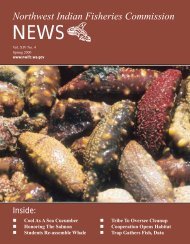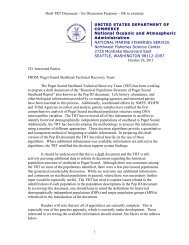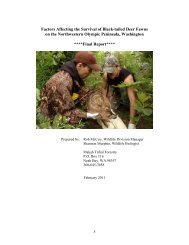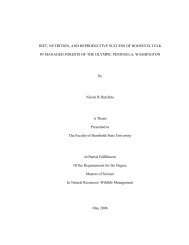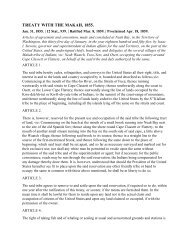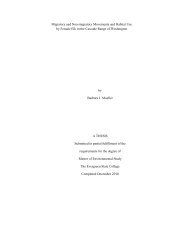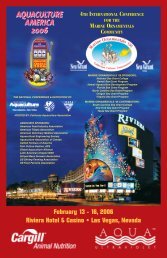NWIFC News - NWIFC Access - Northwest Indian Fisheries ...
NWIFC News - NWIFC Access - Northwest Indian Fisheries ...
NWIFC News - NWIFC Access - Northwest Indian Fisheries ...
Create successful ePaper yourself
Turn your PDF publications into a flip-book with our unique Google optimized e-Paper software.
Marine Sanctuary Council Formed<br />
The coastal treaty <strong>Indian</strong> tribes,<br />
the state of Washington and the<br />
federal National Oceanic and Atmospheric<br />
Administration’s (NOAA)<br />
National Marine Sanctuary Program<br />
have established an Intergovernmental<br />
Policy Council to manage<br />
the marine resources of Olympic<br />
Coast National Marine Sanctuary<br />
(OCNMS). The policy council will<br />
provide a forum for tribal, state and<br />
federal governments to coordinate<br />
activities within the sanctuary.<br />
A memorandum of agreement<br />
(MOA) was signed in January in<br />
Olympia. The Intergovernmental<br />
Policy Council will facilitate<br />
communication, the exchange of<br />
information and recommendations<br />
regarding management of marine<br />
resources within the sanctuary.<br />
“This policy council is a landmark<br />
collaborative opportunity, one of<br />
the first of its kind and a tribute to<br />
the resolve of the partners vested in<br />
the future of the sanctuary waters,”<br />
said Daniel J. Basta, director of<br />
NOAA’s National Marine Sanctuary<br />
Program.<br />
OCNMS was created in 1994, encompassing 3,310 square miles<br />
of Washington coastal waters from Neah Bay to the Copalis River.<br />
The area is home to many marine mammal and seabird species,<br />
diverse populations of kelp and intertidal algae and thriving invertebrate<br />
communities. The sanctuary is entirely made up of the<br />
‘Collaborative management ...<br />
is a positive step toward<br />
preserving these resources<br />
for generations to come.’<br />
– David Hudson,<br />
Policy Spokesperson,<br />
Hoh Tribe<br />
traditional harvest areas of the Hoh, Makah and Quileute tribes and<br />
the Quinault <strong>Indian</strong> Nation (QIN). As sovereign nations, the tribes<br />
have treaty fishing rights and co-management responsibilities<br />
with the state of Washington for fish and other natural resources<br />
within the sanctuary.<br />
“This is another positive step toward an ecosystem-based approach<br />
to managing these resources,” said Mel Moon, natural<br />
resources director for the Quileute Tribe. “We must address the<br />
entire ecosystem and the relationships between the various components<br />
to ensure effective management.”<br />
Olympic Coast National Marine Sanctuary is surrounded by the traditional fishing grounds<br />
of the Makah, Quileute and Hoh tribes and the Quinault <strong>Indian</strong> Nation. Photo: D. Preston<br />
“The policy council brings tribes to the table and integrates<br />
us into the management and decision-making process about resources<br />
that we co-manage with the state within the sanctuary,”<br />
said Jim Woods, policy representative for the Makah Tribe. “This<br />
is an important step in improving federally mandated governmentto-government<br />
communication between the tribes, the state and<br />
the sanctuary on coastal marine matters.”<br />
Coordination of research projects within the sanctuary was a key<br />
reason the treaty tribes sought the creation of a policy council.<br />
Tribes are especially interested in research of low oxygen zones<br />
like the one that occurred this past summer off the beaches of<br />
the QIN.<br />
“In the modern era of fisheries management, no one remembers<br />
ever seeing anything like this,” said Ed Johnstone, fisheries<br />
policy representative for QIN. “We need additional and more<br />
accurate monitoring devices and more research to understand<br />
what’s going on.”<br />
The Hoh Tribe is also eager to participate in coordinating research<br />
projects, said David Hudson, policy spokesperson for the<br />
Hoh Tribe. “Many Hoh tribal members have observed a decline in<br />
certain marine resources such as razor clams, smelts and flounder<br />
in recent years. Collaborative management within the sanctuary is<br />
a positive step toward preserving these resources for generations<br />
to come.” – D. Preston



